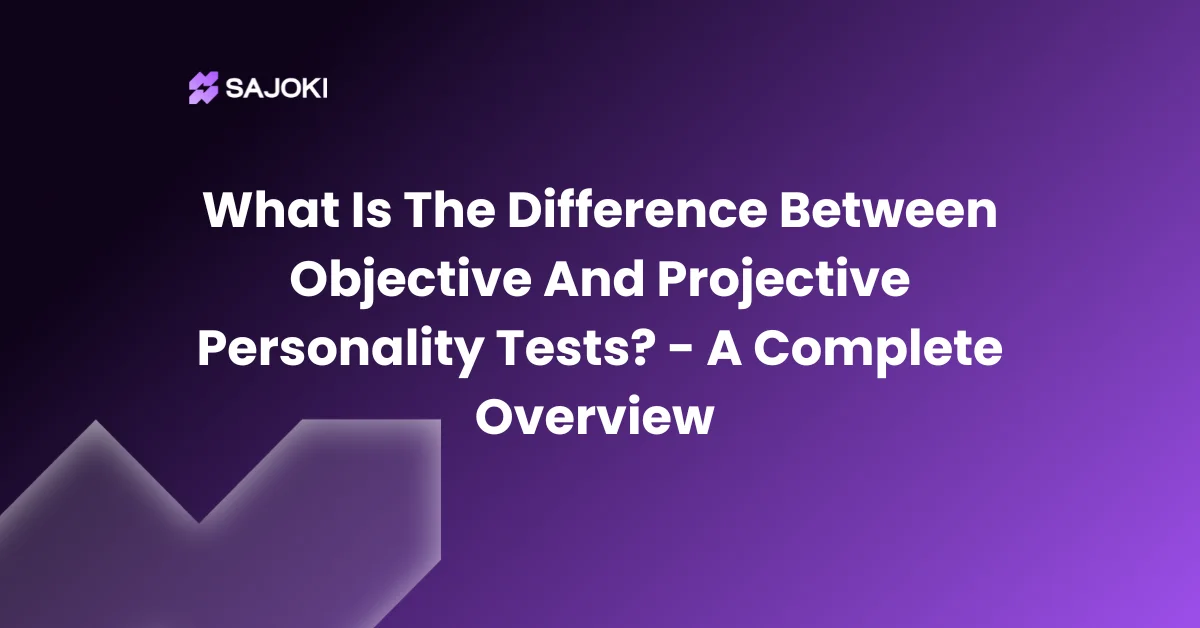Personality tests have been around long enough that people are well aware of what they do. However, there still seems to be ongoing confusion about the two major types of personality tests, which are objective and projective.
So, what is the difference between objective and projective personality tests?
Objective and projective personality tests vary in their approach to personality. Objective tests look into a range of traits without focusing on their depth, whereas projective tests treat personalities holistically. Their interpretation method and applicability also differ drastically.
In this blog, we will be getting into the details of how projective and objective personality tests differ. Additionally, we will tell you their pros and cons as well as how to choose between the two. So, without further ado, let’s get right into it!
Understanding Objective And Projective Personality Tests
People across the globe have been using objective and projective personality tests to gain key insights. Despite the widespread use, not many people are aware of what these tests do or their differences.
Before we get into what is the difference between objective and projective personality tests, let’s first get a clear understanding of the two personality test types.
Objective Personality Test
Object personality tests are simple, structured tests. Such tests come with pre-defined answers. Typically, the format is based on True/False or multiple-choice answers, which sets up a low subjective interpretation.
These tests can measure knowledge, skills, and abilities. Moreover, the scoring system is numerical, with a standard result analysis system for all test-takers. A common example of an objective personality test is the Minnesota Multiphasic Personality Inventory (MMPI).
Projective Personality Test
A projective personality test has a rather unconventional approach. This type of test uses an ambiguous stimulus, such as an image or scene, to evaluate you.
The results are interpreted based on the individual’s unique reaction to the stimuli. Therefore, these tests require a professional clinician to conduct the evaluation. This method also results in a more objective assessment.
A common example of a projective personality test is the Rorschach Inkblot Test.
Key Differences Between Objective and Projective Personality Tests
Now it should be clear what objective and projective personality tests are. So, let’s jump straight into what is the difference between objective and projective personality tests.
1. Approach To Human Personality
One of the major differences between objective and projective personality tests is their approach to human personalities.
Objective tests treat personalities as layers or dimensions. These tests are based on the idea that personality traits can be quantified and even scored. This test also believes that individuals can accurately report on their traits, behaviors, and preferences.
On the other hand, projective personality tests tackle the human subconscious. The foundation of these tests is built upon the undiscovered parts of your personality, which are to be revealed by your subconscious.
Projective tests allow an individual’s mind to explore freely in response to a stimulus. Then, they evaluate how the individuals will showcase their internal thoughts, feelings, or conflicts onto the stimulus.
2. Interpretation Method
Another striking difference between the two tests is how they interpret the responses. Objective tests follow a controlled method to analyze all the responses. The answers are scored based on pre-set criteria.
This means the evaluation of an individual by two different psychologists would result in the same conclusion. This sets a fair ground for all individuals, and more importantly, reduces any interpretation bias.
Alternatively, projective personality tests interpret responses with more freedom. There is no pre-defined criterion for these tests, rather clinicians try to approach the responses with an open mind.
This helps to create a more nuanced, personalized analysis. However, it also introduces a more subjective interpretation. So, two clinicians may or may not interpret one’s responses in different ways.
3. Depth Of Psychological Exploration
Objective personality tests generally cover a wide range of traits, behaviors, or preferences. However, they don’t go in-depth when covering these topics. This makes them futile for a comprehensive psychological assessment.
However, they target a long list of traits or qualities in a very short time. Thus, making them ideal for situations that need to efficiently compare personality traits, such as recruitment.
Projective personality tests are all about in-depth psychological exploration. Their goal is to dissect personalities and study each layer with extensive force. They aim to see what’s underneath the conscious layer of the personality. Hence, they’re perfect for long-term therapy or complex clinical cases that need to go beyond surface-level information.
4. Role Of Test-Taker
The roles of the test-takers are also an important distinction. In objective tests, much of the responsibility is placed on the test-taker. They are expected to provide honest, accurate answers.
What raises concern in this case is that nothing holds the test-takers liable. Moreover, even with good intentions, an individual may fail to provide accurate answers due to test-related anxiety.
Projective tests don’t really rely on the test-takers. Due to ambiguous prompts, the test-takers can’t manipulate the answers. The answers are more spontaneous.
Moreover, results are based on the clinician’s interpretation. Their best judgment is to be trusted in this case.
5. Practical Application And Usability
In the real world, objective personality tests are used more frequently. Corporate settings or educational institutions favour these tests due to their standardization and reliability. Moreover, their results are easy to compare across individuals.
By contrast, the use of projective tests is limited to therapeutic or forensic settings. They’re typically used by trained professionals, rather than HRs or general users.
Strengths and Limitations Of Objective and Projective Tests
Understanding the benefits and challenges of these tests is essential if you’re interested in using either of them. This will help to clarify when and how they should be used.
Objective Personality Tests
Pros
- Well-maintained consistency in the test structure increases reliability.
- Easy to administer and interpret without the support of a professional.
- Results are numerical and easy to understand.
- Minimal personal bias when interpreting the results.
- Time-efficient and practical for large-scale use.
Cons
- Doesn’t look into deeper, unconscious traits or emotional conflicts.
- Challenges regarding self-report testing, such as test-takers may provide socially favorable answers.
- Limited flexibility in capturing the respondent’s unique traits due to fixed responses.
Projective Personality Tests
Pros
- Reveals hidden emotions, inner conflicts, and personality dynamics.
- Results provide very personalized insights into each test-taker.
- Useful in therapy, forensic evaluations, or deep clinical work.
- Difficult for test-takers to fake their answers deliberately.
Cons
- No standardized system for interpretation and hence lower reliability.
- Potential for bias from the clinician’s side.
- Requires specialized training.
- Can be time-consuming.
Choosing The Right Type Of Personality Test
Both objective and projective personality tests have their place in psychological testing. However, their goals and purpose vary significantly. Hence, these tests should be selected thoughtfully and with the right intentions.
So, here is how to choose the right type of personality test.
1. Assess Your Expectation From The Test
Start by considering what you want or need from the personality test. If you want surface-level yet efficient insights, go for an objective personality test. It is a more practical choice for large-scale use, such as in recruitment.
For more complex needs, you have to opt for a projective personality test. It is more appropriate for deeply rooted psychological concerns or unclear diagnoses.
2. Think About The Test Environment
Objective tests are ideal when your time or resources are limited. They’re easier to administer, cost-effective, and scalable. On the other hand, projective tests are to be conducted in a private, controlled setup. They are more resource-intensive and better-suited for institutionalized use in clinics.
3. Assess The Test-Taker’s Ability to Self-Reflect
If you think your candidates can understand themselves and be honest about it, then objective tests should do the job. Objective tests are done on the basis of the test-taker’s self-awareness.
However, you can’t use objective tests on a candidate who lacks self-awareness or is in denial about their condition. In such cases, projective tests are the right choice.
4. Consider Validity And Reliability
Objective tests are considered more reliable due to their repeatability and consistent scoring. If you want to prioritize hard data, these tests are preferable.
Projective tests have the upper hand when psychological depth is the priority. Although their consistency is often questioned, they offer profound and multi-layered yet sophisticated insights.
FAQ
Q. Are projective tests still used today?
The use of projective tests has decreased quite a bit over time. Despite this, many psychologists worldwide appreciate and use the tests every now and then.
Q. Is the 16PF a projective test?
No, the 16PF is an objective test.
Q. Do employers use projective personality tests?
Employers usually prefer using objective personality tests. However, they can sometimes use projective tests to get deeper, underlying insights into their candidates.
Conclusion
That’s all on what is the difference between objective and projective personality tests. Both these tests offer deep, meaningful insights into human beings. However, their functionality and the purpose they’re meant to serve are nowhere near similar.
Moreover, the use case of both these tests is vastly different. Due to their differences, it’s important to know what you’re looking for. You have to align your expectations with the purpose of the personality test. After all, only the right type of personality test will lead to impactful and reliable decisions.





